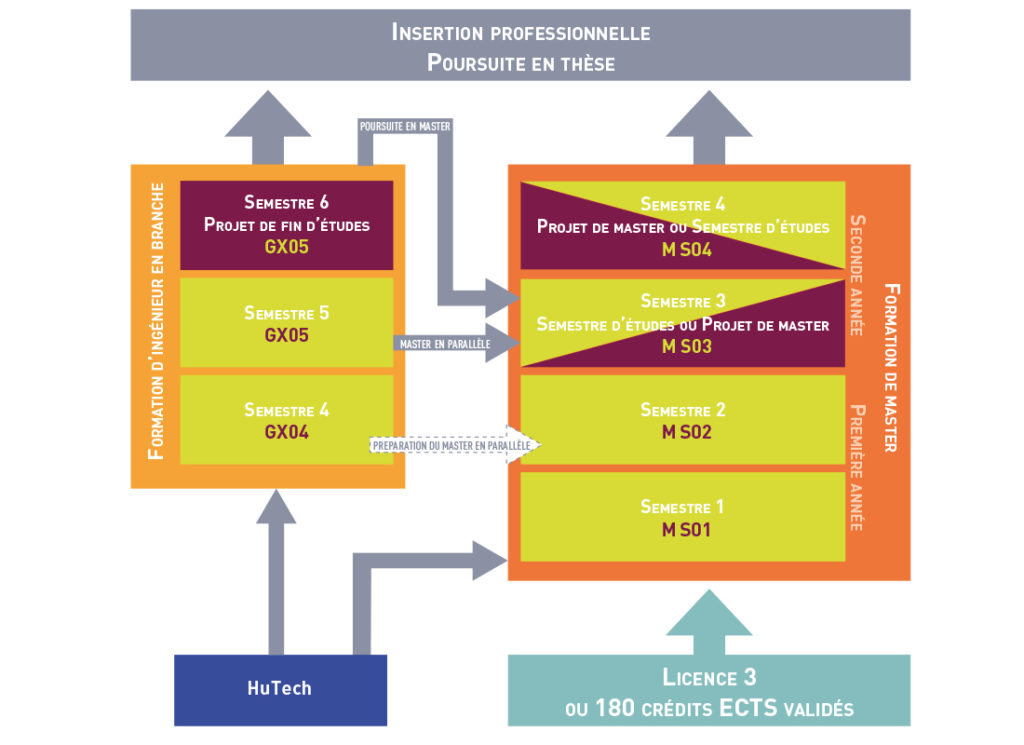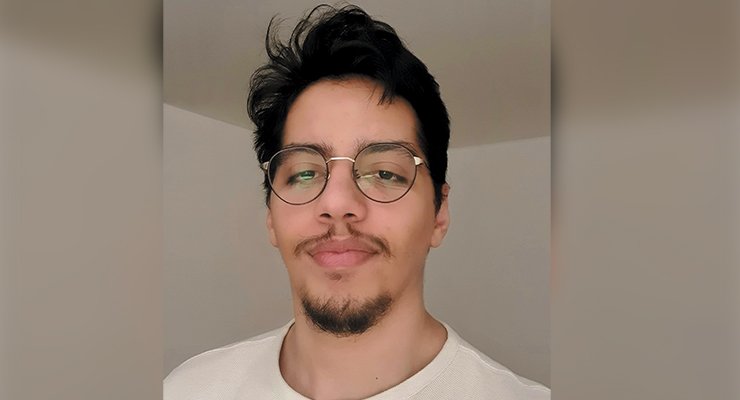The master's degree
By registering for a Master’s degree at UTC, you will approach – with internationally renowned professors-researchers – some of the major scientific problems and issues that impact our daily lives.
Description
UTC’s Master’s degree courses prepare students to become experts and to take up the challenges of research and advanced industry in the fields of automation, biology, biotechnology, chemistry, design, computer science, innovation, mechanics, mechatronics, robotics, health, data science and biomedical technologies. Some courses are integrated in the projects of the Government Incentive programme "Investissements d'avenir" in which the research laboratories of the UTC participate (institutes of excellence, Labex, Robotex, Équipex, IRT…).
Organisation of the master's degree programmes
In the first year, you follow the joint courses and some pre-specialisation courses, then you choose the more specific courses of one of these specialties in the second year.
The two years programme is divided into four semesters of 17 weeks each. During each semester, you will have the choice between several Credit Courses (CCs) and Teaching Units (UE) corresponding to your level and your study profile. The total number of ECTS credits corresponding to the courses you have enrolled in must not exceed 36 credits/semester.
These are grouped into categories:
- Scientific knowledge ;
- Techniques and methods ;
- Technology and Human Sciences;
- Projects and laboratory work plus external assignments.
To qualify for the Master’s degree, you must have acquired a certain minimum number of credits in each of these categories according to a profile defined for each field and specialty of the course chosen. The studies at UTC lead to award of the national Master's degree.
En savoir plus sur les UE

First year M1
The courses offered in the first year M1 enable students:
- to reinforce their earlier educational base
- to have an introduction to new subject-matters in the specialty chosen
- to have an introduction to commentary, add-on training subjects
- to benefit from further training in at least one other foreign language
Validation of the 1st year and access to the 2nd year
To be able to continue your studies in the second year of the Master's programme, you must validate at least 60 credits in the courses offered in the first year, split between the categories according to the profile defined for each field.
Admission to the second year leading to the national master's degree is not automatic. The decision lies with admissions jury after examining your personal file track-record.
Second year M2
The Master M2 specialty chosen enables students:
- to reinforce and learn more in-depth the core programme contents of the specialty
- to acquire a high level expertise in a specific applied field
- to prepare for a professional posting, in industry, research or to pursue for a PhD
The first semester of M2 is devoted to classwork and the second semester to a placement either in a research lab or in enterprise, ending with a dissertation and a presentation before a Jury.
Validation of the course
To validate your training in the second year of the Master's programme, you must have acquired at least 30 credits in the courses offered in the specialty of your choice, split into categories according to the profile defined for each specialty. You must also validate the 30 credits corresponding to the long-term internship.
Technology, social sciences and humanities
The Department of Technology and Social Scieces (UTC-TSH) proposes courses related to human sciences, lying at and exploring the heart of the situations you will meet in your professional life on a daily basis.
The pedagogical projects of the course contents and specialties all devote a more or less important portion of time and assets to TSH teachings in their training. These courses always include at least the learning of a modern language and for as long as the level required for graduation has not been reached.
Other courses are offered to learn about the world of business, organizations and management, to communicate not only in a foreign language, but also in different professional situations and, finally, to do design work, through the mastery of knowledge relating to the way technology affects human activities. These courses are more widely developed and deepened in the specializations and fields which are centred on human sciences.
Foreign languages (and French as a foreign language) at UTC
Language teaching aims not only to improve students' linguistic skills, but also to make them aware of issues and problems related to communication and culture.
The languages mainly taught in the Master's programme are English and French as a Foreign Language (FLE). Other languages are taught at the UTC, but these courses will only be accessed to students having validated the required level in the two main languages.
The UTC Master's degree is awarded to students whose mother tongue is French and who have reached the level B1 in English of the Common European Framework of Reference for Languages of the Council of Europe or who have reached level B1 in French as a foreign language for others. This level is validated by obtaining a level 2 CC in the chosen language.
You may complete this level in English by obtaining a minimum score of 550 in the TOEIC (Listening and Reading Test), or any other test certifying level B1.
Job opportunities
All the courses in the Master's programme lead to careers in engineering and research, or to a PhD thesis.
During the course of your studies, you can, from the first year, carry out a short internship in a research laboratory.
You can carry out your end-of-studies project (5 months) in one of the research laboratories of UTC or of another university, or in a partner company, by applying to the internship offers directly received by the Service Étudiants Entreprise Emploi (3E), which benefits from having more than 5 000 contacts in France and abroad.
Continuing education and VAE
Master's degree through continuing education
UTC-Compiegne is authorized to deliver the national diploma of the Master’s degree via its continuing education programme. This training is open to people having a level Bac+3, a diploma equivalent Bac+3 or even 5 years of experience according to the mention recognized by the jury of admission.
The organization of the courses into modular units makes it possible to adjust and individualize the course of study according to the professional objectives of the candidates and their achievements, for example: to gain admission to the M2 year of the Master's programme.
Master's degree by assessment of prior education/experience
The validation of acquired experience (VAE) concerns people with a minimum of one year's experience as a technical manager or similar, directly related to the Master's degree envisaged. The validation is pronounced by a jury on the basis of an activity report and an interview.
The candidate must prove that he/she has the same knowledge and aptitudes as a student who has followed a complete course. The VAE jury decides on the extent of the validation granted and, if necessary, on the nature of the knowledge and skills that must be the subject of a complementary test.
Master's degree in parallel
UTC proposes to the students at the end of their branch to follow one of the second year courses of the UTC Master’s degree, in parallel with their final year of engineering studies.
The students complete their engineering curriculum and follow in parallel the courses of a Master's programme in the autumn semester. They then carry out an end-of-studies project in the spring semester in a laboratory or partner company, which can be validated simultaneously by their engineering and master's courses. Students who plan to do the Master's degree in parallel with their final year of engineering studies are encouraged to take some of the first year Master's courses during the spring semester before they enter the second year Master's programme.
At the end of these courses, the students obtain their UTC engineering diploma and their national Master’ degree.
All the information on the Master’s degree courses, the admission requirements, the applications are available in the downloadable document below.



